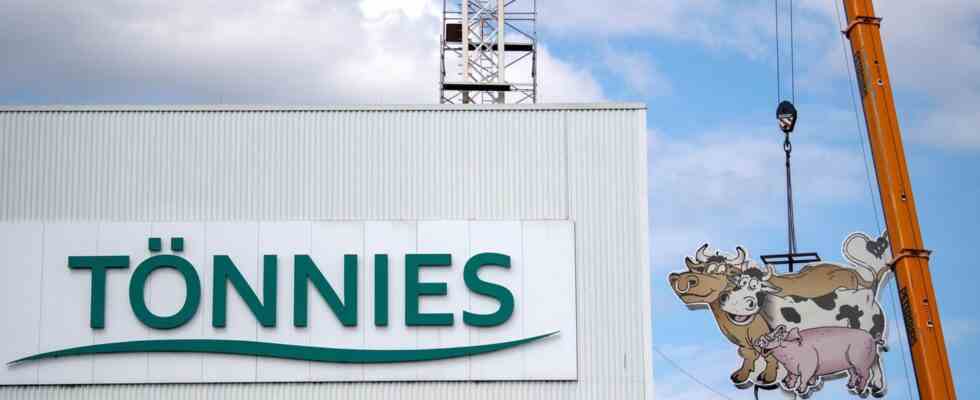After criticism
Meat company Tönnies stops recruiting Ukrainian refugees directly at the border
Tönnies factory in Rheda-Wiedenbrück
© Lino Mirgeler / DPA
Slaughter group Tönnies has recruited refugees as workers right on the Polish-Ukrainian border. After criticism from activists, the group has now stopped this practice.
Almost two and a half million Ukrainians have already fled across the Polish border because of the war. The slaughterhouse Tönnies would like to use some of them as workers in its factories. But the way the recruitment attempts were made caused criticism – the group has now stopped the controversial practice.
Like the ARD magazine panorama and activists report on Twitter, Tönnies employees distributed leaflets to war refugees in the Polish border town of Przemyśl in order to recruit them as production helpers. They were also promised transport to Germany and accommodation. Tönnies confirmed to Panorama that three employees had been sent to the border to recruit workers. According to critical reports, that explained company then on Thursday: “Sorry, maybe we were too hasty here. That’s why we stopped the offer for the time being.”
Patrick Walkowiak from the refugee organization Friends of Medyka accused Tönnies in the ARD report of exploiting the plight of the refugees. Walkowiak is there himself and has experienced the recruitment attempts. The conditions in the Przemyśl reception center are chaotic. In this extreme situation, the refugees cannot understand the recruitment attempts, says the refugee worker. There is a lack of buses and other means of transport, so refugees sometimes have to stay in the camp for days. And Tönnies only took those who were willing to sign an employment contract.
Tönnies reacts to criticism
Tönnies could not understand the criticism at first. “We help the war refugees on the ground and offer them future prospects,” a company spokesman told Panorama. About a dozen refugees from Ukraine have already been hired at two locations in Germany. Tönnies offers eleven euros an hour, which is above the statutory minimum wage. And: “Only if the refugees work at Tönnies, they may be accommodated in our official apartments.”
However, accommodation costs are deducted from the salary. In the past, the accommodation of Tönnies employees in overcrowded factory accommodation and the poor working conditions in the slaughterhouses had repeatedly been publicly pilloried.
Inge Bultschneider from the “WerkFAIRträger” interest group, which campaigns for better working and living conditions for migrants in the meat industry, thinks the recruitment attempts are tasteless. “Enriching oneself from misery and selling it as a good deed is nothing new in the meat industry. We experienced something similar in 2015 with the wave of refugees,” Bultschneider told the Panorama. Tönnies replied: “We don’t enrich ourselves from the plight of the refugees. That’s a completely wrong statement. We don’t disguise anything as a good deed.” It was only about helping people, the company added in a statement on Thursday.
What is also piquant about the whole story is that company boss Clemens Tönnies has had excellent relationships with Russia and even with Vladimir Putin personally for years. As the head of the supervisory board at Schalke 04, he once engineered the sponsorship deal with Gazprom, and in Russia he invested in pig farming. The photo that Tönnies shows beaming together with Putin when handing over a Schalke jersey with Gazprom lettering, he would probably like to forget today. He recently told the Handelsblatt: “Like many others, I was wrong about him.”


